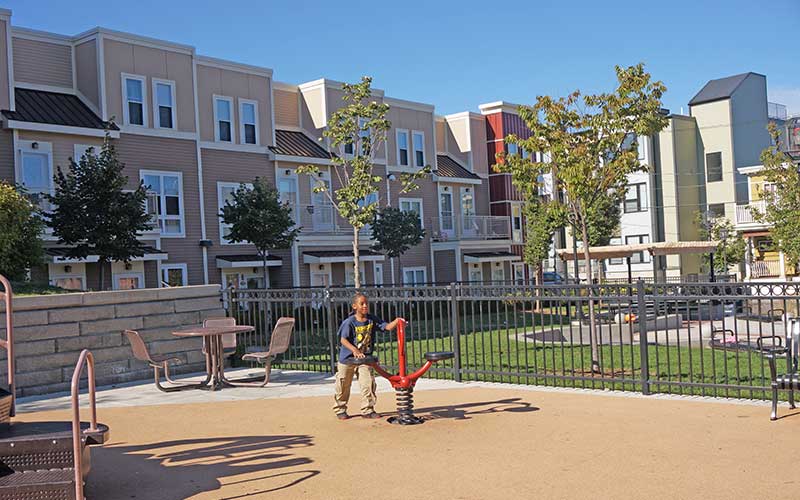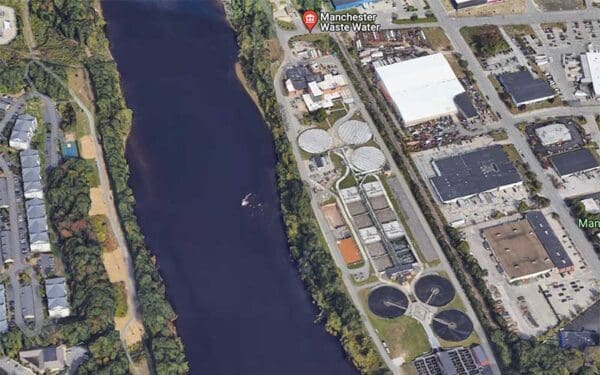
A playground at the new Chelsea Flats development. Photo: Deborah Addis
UPDATE: By unanimous vote, environmental justice language – which gives residents of historically disadvantaged neighborhoods more say in what happens in their own backyards – from one of our key bills has moved forward. This language has now been incorporated into the House Roadmap bill, which is being combined with the Senate Climate bill – a big win for both environmental justice and climate action. These critical climate bills are designed to help Massachusetts lower its polluting emissions by adding timelines and milestones to our existing Global Warming Solutions Act. With this new language, the climate bills will ensure that neighborhoods disproportionately impacted by pollution and other environmental harms are not left behind as we transition to a clean energy economy.
We must now pass these climate bills and codify this justice language into law. Contact your local legislators and urge them to support the Massachusetts Roadmap bill with this environmental justice language included.
The COVID-19 crisis has made clear what the environmental justice movement has been telling us for decades – low-income, immigrant, and communities of color experience more environmental burdens than whiter, wealthier neighborhoods. Now, historically marginalized communities have been hit hardest by the pandemic – in great part because of prolonged exposure to high levels of air pollution.
Having strong environmental justice legislation in Massachusetts would make a significant difference in these neighborhoods, in part by simply ensuring residents will have a voice in what happens in their own communities.
As part of an ongoing series to discuss environmental justice in Massachusetts, I spoke with María Belén Power from GreenRoots, Andrea Nyamekye of Neighbor to Neighbor, and my CLF colleague Staci Rubin.
Below is an excerpt from our conversation, edited for clarity.
Why is having an environmental justice law so important?
Staci Rubin, CLF: We’ve always needed this [environmental justice] legislation, and the pandemic is just exposing and illustrating how important and critical it is that this gets passed now.
Environmental justice is all about the equitable distribution of benefits and burdens, and equity means that people get what they need. So right now, the people who need environmental quality and public health the most are those in these environmental justice communities – people of color, low-income residents, limited English proficient residents – who really need to be able to influence what happens in their neighborhood.
What would these environmental justice laws do for Massachusetts?
Staci Rubin, CLF: The bills would address two big pieces. There’s a procedural side that it would accomplish, and then a substantive side.
On the procedural side, we see that there is a need for better process. Any governmental agency decisions need to ensure there’s an informed public to make public comments and that those public comments influence the actual outcome. So, the bills would require there be a written translation that adequately describes what a proposed project might be in advance of any decisions. They would [also] require that any public hearings happen in a comfortable location that’s easily accessible for the community – for example, in thinking about people who are concerned about being deported or immigration issues [in general], making sure that a public hearing is not located in a federal building where people are scared to even show up to make their voice heard.
And then the bills would require that any costs for doing the translation, and also the simultaneous language interpretation that happens live with these public hearings, would be paid for by the project proponent. So, [the bills are] placing these additional responsibilities on the proponent of a project and not on the residents of the neighborhood where the project would be built.
On the substantive side, the bills would require there be a meaningful review by government agencies of a project’s impact on environmental justice populations. It’s an added layer of review to figure out what the public health impacts – negative or positive – are. There’s [also] a requirement to identify what potential benefits might be available for those communities. Up until now, the project review process really hasn’t considered who lives in an environmental justice population and who doesn’t.
These bills would change that. They would clearly identify the census block groups that are most in need of protection and ensure that there’s meaningful review of what would happen in those neighborhoods if a project is built.
Why is now the time to pass environmental justice legislation?
María Belén Power, GreenRoots: If the legislature doesn’t pass environmental justice legislation now, I don’t know when they’re going to pass it. [The disproportionate impact of COVID-19 on our communities] is the most drastic, the most extreme case of what happens when we don’t have these protections that we’re probably ever going to see in our lifetime.
You know, I feel like we’ve said this before: “Now is the time, now is the time, we need environmental justice now!” But for real, now is the time. If they don’t do it now, I just don’t know what it is going to take. Black and Brown people are dying disproportionately [from COVID-19]. And if they don’t see the connection with environmental justice, I just don’t know how else they’re going to see it.
Andrea Nyamekye, Neighbor to Neighbor: I agree. The time is now. I’ve heard so many sayings going around – “the emperor is naked,” [and] “all these unjust systems have been unveiled.” Everything that hasn’t been working for decades has been put out there in the open with COVID.
[A few] weeks ago, I put on cable news. The news stories were all of Black and Brown folks dying from COVID at disproportionate numbers compared to other people. And then there was the task force briefing that always happens, and Dr. Fauci [head of the National Institute of Allergy and Infectious Diseases] said something like, “Yes, we’ve known that these communities have all of these comorbidities and therefore they’re dying, etc.” And I was like, yeah! How long did it take for people to realize that we have been dying from all of these issues for decades now – for so much longer than just what’s happening [now] and COVID.
And so, I agree with María Belén. If now is not the moment to make this shift, then when is the moment?
There can’t just be more pandemics or more issues that happen where we go back to [the fact that] we’ve known that this has been going on forever. Right now is definitely the time to not only have the environmental justice protections, but really reshape these communities and have them lead in that decision making. Because I don’t want to be hearing down the line that this is an issue that’s happening again. The chance is now to really make that shift.
This blog is one in a series about environmental justice in Massachusetts, and the critical work being done in the legislature to address it. It was originally published on July 1, 2020. Read the entire series here.
María Belén Power is the Associate Executive Director of GreenRoots, a community-based and resident-led environmental justice organization working in Chelsea and East Boston, Massachusetts.
Andrea Nyamekye is the Campaign and Policy Director at Neighbor to Neighbor, a Massachusetts-based grassroots power-building organization working to improve quality of life for local communities.
Staci Rubin is a Senior Attorney at CLF focusing on transportation advocacy and its intersection with public health and the climate crisis.




